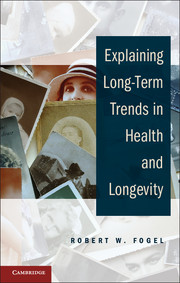Book contents
- Frontmatter
- Contents
- Tables
- Figures
- Acknowledgments
- 1 Foreword
- 2 Secular Changes in American and British Stature and Nutrition
- 3 Second Thoughts on the European Escape from Hunger
- 4 Trends in Physiological Capital
- 5 Changes in Disparities and Chronic Diseases through the Course of the Twentieth Century
- 6 Some Common Problems in Analysis and Measurement
- 7 Afterword
- References
- Index
7 - Afterword
A Conversation with the Author
Published online by Cambridge University Press: 05 November 2012
- Frontmatter
- Contents
- Tables
- Figures
- Acknowledgments
- 1 Foreword
- 2 Secular Changes in American and British Stature and Nutrition
- 3 Second Thoughts on the European Escape from Hunger
- 4 Trends in Physiological Capital
- 5 Changes in Disparities and Chronic Diseases through the Course of the Twentieth Century
- 6 Some Common Problems in Analysis and Measurement
- 7 Afterword
- References
- Index
Summary
Professor Fogel, welcome to Berkeley.
Wonderful to be here.
Where were you born and raised?
I was born and raised in the Bronx – New York City, for Californians who may not have heard of the Bronx.
That’s right, although there are many émigrées here, so some of us have heard. In looking back, how do you think your parents shaped your thinking about the world?
My parents were very loving, very optimistic people, and they gave me an optimistic outlook on life. My father arrived at Ellis Island penniless in 1922, and by 1929, he had saved enough money to open his first business. By 1939, even though the Great Depression was still in progress, he owned a business that employed over a hundred people.
I’ll tell you something that reflected the improvement in the status of the Fogel family.My brother, who was six years older than me, and nine years ahead of me in school, was a freshman at City College in New York in 1936 when I was only ten years old. And I remember he and several of his friends having a conversation at my house one night when I was supposed to be asleep. The topic was what do you do for a date if you only have ten cents? The answer was, find a girl who is babysitting; a nickel will get you there and a nickel will bring you back. But by the time I went to college in 1944, it was at Cornell, a private school, and on an allowance that would have staggered my brother in 1936.
- Type
- Chapter
- Information
- Explaining Long-Term Trends in Health and Longevity , pp. 133 - 146Publisher: Cambridge University PressPrint publication year: 2012

